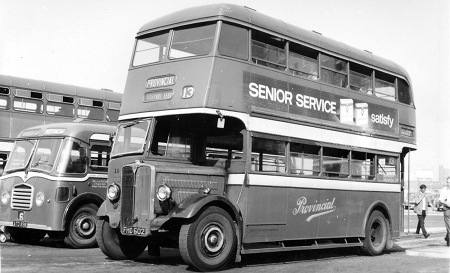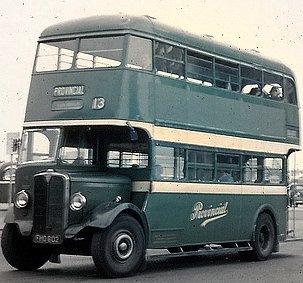
Photographer unknown – if you took this photo please go to the copyright page.
Provincial (Gosport & Fareham Omnibus Co)
1947
AEC Regent II
Reading H56R
The AEC Regent II was only in production for three years 1945 – 48 and just under 700 were made but at the time just after the war they were much in demand. There wasn’t any variations either it came with a 7.7 litre 6 cylinder oil engine, four speed sliding mesh gearbox otherwise known as a crash gearbox and vacuum assisted brakes, but on saying that it was well capable of doing the job and most of all it was very reliable. Of course there was a choice of body and the above bus had one from the local Portsmouth bodybuilders Reading who built and rebuilt quite a few buses for Provincial.
Bus tickets issued by this operator can be viewed here.
When Provincial re-built their Guy Arabs with air-cooled Deutz engines, they built the lower decks of the bus bodies themselves, then sent the half-completed bodies to Portsmouth bodybuilder, Reading, who built the upper deck and roof. A strange practice indeed.
Reading also built several bodies for Portsmouth Corporation buses, too.
Chris Hebbron
Provincial had 4 of these Regent IIs, numbered 10-13 (FHO 602-5). Strangely enough, no.10 was the only one of the batch not to undergo any significant rebuilding (with the exception of a minor alteration to the destination box layout in the late 1950s) and was also the last one withdrawn in December 1968. By 1959,11/12 were found to be suffering from body rot and were subsequently rebuilt using the wartime Reading bodies from AEC rebuilds 14 (EOR 251) and 15 (EHO 282); whilst 13 was initially converted to open-top in 1958 following a collision at Fareham Railway Arch, and rebuilt to closed top once more by Reading in 1960.
For further photos of Provincial vehicles, here are a couple of links:
//www.flickr.com///www.regent8.co.uk/ (select ‘In Focus’)
Stephen Didymus
14/07/12 – 18:29

Copyright Beckingtonian (Flikr) with his permission.
Here is a colour photo of a very smart No. 10, taken in 1968, just a year before its withdrawal, as scrap, in April 1969, after a creditable 22 years of service.
Chris Hebbron
Leave a Reply